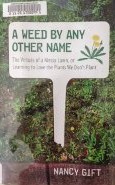 After reading Nancy Gift’s book, A Weed by Any Other Name, you will gain a whole new perspective on weeds. After all, one man’s weed is another man’s prize plant, as someone said. Nancy Gift points out that a weed is just a plant out of place. She does more than grudgingly accept them, she sees them as reminders of who she is and where she came from and sees them as an indicator of the condition of land.
After reading Nancy Gift’s book, A Weed by Any Other Name, you will gain a whole new perspective on weeds. After all, one man’s weed is another man’s prize plant, as someone said. Nancy Gift points out that a weed is just a plant out of place. She does more than grudgingly accept them, she sees them as reminders of who she is and where she came from and sees them as an indicator of the condition of land.
The book is divided into four major sections by seasons, each one dealing with some major weeds that the author has encountered. Spring brings a battle with multiflora roses that Gift expects to wage on an ongoing basis. She discusses other weeds such as wild garlic, foxtail grass, violets, clover, and dandelions with a more appreciative tone and includes a recipe for dandelion wine. Summer focuses on hawkweed, prostrate spurge, scarlet pimpernel and moss while Fall includes plantain, ragweed, morning glory, and crab grass. Poison ivy, chickweed, Japanese knotweed, thistle and clover get special attention in the Winter section. All through the text Gift imparts her love of plants and points out the good characteristics of the weeds as well as the problems. She is especially attuned to the importance of the natural ecosystem and taking care of the environment for the benefit of all. Sure, some weeds like multiflora roses and poison ivy need limits and have to be treated with herbicides but they are in the minority. Big benefits can be reaped if people learn to appreciate the virtues the ordinary weeds that grow in their gardens and lawns, and allow them to grow instead of reading for herbicides.
Gift gives her perspectives on weeds as a suburbanite, mother, teacher, amateur naturalism, and trained weed scientist. She takes the readers through her personal and professional memories and experiences with the plants most people consider weeds and shows us that perhaps the term is not as pejorative as they might have thought. Her appreciation of these plants, weeds or whatever you choose to call them, can help any gardener live with more of them and with less herbicides. This is not a reference book on weeds but rather a sensitive approach to understanding and appreciating the plants that appear in our gardens and lawns uninvited.